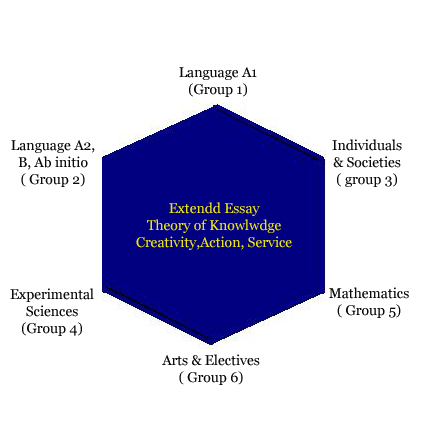|
The
International Baccalaureate (IB) Diploma Programme:
Often colloquially referred to simply as "IB", is an educational programme
taught in one of three languages (English, French or Spanish) and is
intended for students in their final two years of secondary schools often
before entering university. It is taught in 1895 schools, to a great extent
in international schools, in 124 countries (as of 2006). The programme,
administered by the International Baccalaureate Organization, is one of the
most widely recognised pre-university educational programmes in the world
Curriculum: The Diploma Programme (DP) curriculum consists of
completing six courses from six different subject areas, writing an Extended
Essay (EE) of up to 4,000 words, taking part in the Theory of Knowledge (TOK)
class, and fulfilling a requirement of 50 hours in each of the Creative,
Active and Service (CAS) pursuits. Grades are awarded from 1 to 7 in each
subject, and up to three 'bonus' points may be awarded depending on the
grade results of the EE and TOK. Thus, a total of 45 points may be obtained
by the candidate for their final diploma. In order to receive an
International Baccalaureate Diploma you must receive a minimum of 24 points. If candidates study in a language other than their native
language (i.e. their language A1), they may receive a Bilingual Diploma. If
students choose not to fulfill all parts of the programme they can receive
'subject certificates' for the IB classes they take.
Students pursuing the Diploma take six courses,
usually from six different subject areas (detailed below), with three
(or four) of them taken at higher level (HL) and the rest at standard
level (SL). Higher level subjects require approximately 240 hours of
teaching time, and standard level subjects about 150.
Group 1: Language A1
- Generally the
student's strongest languages, with over 80 different languages
available. Students may choose to self-study a language of their choice
at standard level if their fluent language is not taught by the school.
Group 2: Second Language - An additional language, taken either at
A2, B (SL or HL) or ab initio (SL only). This group may also be
replaced by a second A1 language.
Group 3: Individuals and Societies -
Humanities and social sciences, such as
philosophy,
economics,
business
management,
psychology,
social anthropology, information technology
in a global society (ITGS),
geography and
history (or History of the
Islamic World). At higher level, there are several different
regionalised history classes including: History of the Americas, History
of Europe, History of Africa, History of West Asia, and History of East
and South-east Asia. The variant/s taught is usually largely dependent
on the location of the school. In some schools it is possible to choose
three subjects from this group and none from Group 4 with special
permission from the IBO
Group 4: Experimental Sciences
- Subjects such as
physics,
chemistry,
biology,
environmental systems and
design technology. In some countries, such as
the Netherlands,
Sweden,
Finland,
New Zealand and
Turkey, students are allowed to choose three subjects from this
group and none from Group 3, as it is required for admission into some
universities.
Group 5: Mathematics - The subjects are, in order of increasing
difficulty, Mathematical Studies (SL),
Mathematics SL, and Mathematics HL. Furthermore, Further Mathematics
can be studied at SL in addition to a Mathematics HL course. This group
also includes
computer science but only as an elective (not a substitute for the
other mathematics courses).
Group 6: Arts
- Subjects such as
visual arts,
film,
music,
dance, and
theatre arts. Students can also choose to take another subject from
any of the other five groups to substitute for this group. One of the
main criticisms of the Diploma Programme is that it discriminates
against artists by allowing those specialising in other subject areas to
take a second subject within that Group, but offering no such option for
those favouring the creative arts. The defence often used to counter
this point is that candidates can use their 50 'creativity' hours of
their CAS programme to enrich this part of themselves. At some schools
it is possible to take ecosystems and societies as both a Group 3 and
Group 4 subject, giving the possibility of two subjects from Group 6.
|

